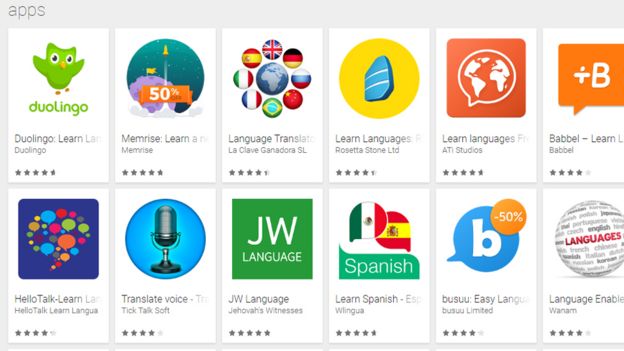
Can apps ever replace classroom language learning or even help revive minority or dying languages?
Apps offer languages - real or invented - not popular enough to be taught at evening classes or most universities.
Esperanto, invented to create world peace, Avatar's Na'vi, Elvish and Star Trek's Klingon are all on the table.
Guy Baron, head of modern languages at Aberystwyth University, said there had been "snobbishness" towards apps, but wants technology used in teaching.
Apart from the weird and wonderful fictitious languages available, people may choose apps to learn a popular language such as Spanish or French, citing the ability to go at their own pace and fit sessions around their existing commitments.
Some apps offer quizzes or word and phrase repetition to boost learning, while others have complete programmes with tutor guidance and the chance to communicate with native speakers.
But users say there are pitfalls such as not fully understanding the grammar and missing the classroom environment with peer support.
Dr Baron said apps should be used alongside traditional classroom methods, not to the exclusion of traditional teaching.
Image copyright Amy Jo Price
Image caption Amy Jo Price is learning Welsh and Gaelic due to having ancestors from Wales and Scotland
For Amy Jo Price, a teacher from Alabama in the US, language apps have become part of her morning routine.
She uses Duolingo for Welsh and Mango for Gaelic, to honour her ancestral roots in Wales and Scotland.
"I log in the same time every morning while I'm drinking my tea and eating breakfast," she said.
"I have made contacts on different Facebook pages and make it a point to discuss the languages and practise with them."
Eugenia Iglesias, based in Patagonia, Argentina, where there is a Welsh settlement, said it was difficult learning via an app - so is taking classes as well.
"Sometimes it's a bit tricky because you miss a lot of grammar structures. You have to learn by repeating sentences.
"I do both (classes and apps) to have a wider understanding of the Welsh language."

The language learning industry is crowded one
People can sign up without much, if any, expense and learn at their own pace ahead of a holiday or event - Japanese overtook Italian in popularity among the Welsh users of the app Busuu ahead of the 2019 Rugby World Cup hosted in Japan.
There was a 97% rise in Busuu users from Wales signing up to learn Japanese in the 12 months leading up to the tournament and a 140% rise during the first week of games - though developers will not release actual numbers of learners, saying it is commercially sensitive information.
Spanish is generally one of the most popular languages among UK learners - online and offline - and is considered one of the simpler languages for English speakers to learn.
On Babbel, 43% of learners from Wales are learning Spanish, about 28% of Busuu's 450,000 Welsh users are registered to learn Spanish and the language takes 25% of Duolingo's learners.
On Duolingo, Japanese is up by 52% this year, which again developers attributed to the rugby tournament and the 2020 Olympics in Tokyo.

Psy's horse-galloping dance move was immortalised in the Gangnam Style video which made a name for K-pop worldwide
Just outside the top 10, Duolingo said there had been a "significant spike" in the number of people learning Korean in the UK, which could be attributed to the rise of K-pop - music originating from South Korea, including the likes of Gangnam Style which went viral in 2012 and influenced popular culture, with the genre increasing in popularity worldwide ever since.
In late 2019 Duolingo launched Arabic and Latin for English speakers and said it was "highly likely" one or both could make the top 10 next year.
Since its Welsh course launched in 2016, more than 1.2 million people worldwide have started learning the language - overtaking Chinese and Portuguese.
With zero Cornish speakers in 1800, the revival of the language since Henry Jenner published A Handbook of the Cornish Language in 1904 is no doubt being bolstered in recent years by its accessibility online, though developers said it still attracts relatively small numbers.
On Memrise, 16,500 people are signed up to learn Welsh but the average time they stick with the course per session was 52 minutes, compared to just 646 learning Cornish where the average engagement time was three hours.
Without regularly-scheduled lessons, attendance being tracked and a classroom setting - do users stick with their chosen language?
"Traditionally one of the biggest barriers facing language learners is motivation," Busuu's co-founder and CEO Bernhard Niesner said.
"Ultimately, what we've found is that retention is closely linked to an individual's goal. For instance, if someone is learning for work, education, or family reasons, they tend to stick with language learning much longer than someone who is learning for travel or fun."
He added there was usually a "huge spike" in new users at the beginning of January, "off the back of 'new year, new me' resolutions".
"Also, we see smaller, but noticeable spikes, at the beginning and end of the summer - which are closely linked to summer travel and learners returning to education."
Ed Cooke, cofounder of Memrise, said his app used a learning technique which makes people "learn incredibly fast" which in turn keeps them interested.
"People learn because they're interested in the people and culture of a language - in the end, everyone wants to be able to communicate and connect with people, that's why they're engaged to learn a language in the first place.
"This is one reason why schooly approaches or apps based on gamifying school-learning don't engage people very deeply - they just teach the words and the rules and there's no connection with the meaning and emotion behind the reason to learn."
The app uses videos of native speakers in context, which were filmed on a crowd-funded double-decker bus tour around Europe.
Duolingo uses inside jokes within the courses to keep users entertained - including a recurring character called Owen who carries parsnips in the Welsh course and inebriated parrots in the Irish course.
Meanwhile Babbel has a team of 150 linguists who build the courses by hand, meaning each language course is completely different, with developers focusing on helping users learn quickly - adding 8% of its customers have admitted to logging in while on the toilet.
Babbel said more than half of its users stay on for 12 months or more.
Alex Levinson, originally from the US but living in London, is learning the constructed language Esperanto - and Welsh - via an app.
Esperanto was invented in 1887 and was designed to become a universal second language to promote world peace and break down language barriers.
"I remember one day I was looking through the languages that Duolingo had and as I was looking, I came across Esperanto," Alex said.

Alex Levinson, 19, is learning Esperanto
"I thought that the name sounded interesting so I looked it up and learned all about how it was intended to be an international language, as the creator believed that conflicts between countries could have been better handled if there wasn't a language barrier and he created Esperanto so that it would be easy for people to learn, no matter what their native tongue is."
Alex, 19, added that Esperanto - not being location-based - borrows from many languages and therefore makes others easier and more interesting for him to learn.
"When learning a language in a class, I've had to learn at whatever pace the instructor sets, which can make learning a language difficult when some people learn things quicker while others may have difficulty with certain concepts, whereas by learning in an app, I can learn at my own pace.
"A few months ago, I got the opportunity to meet another Esperanto speaker at my university and speak the language in person and I was nervous at first, but it really made me realize how proficient I really am at the language and it was really good practice as well."
Milla Leskinen, from Finland, is using apps to learn Welsh, German, Italian, Latin, Swedish and Karelian - the closest relative of her native language Finnish.
"Apart from my general fascination with obscure languages it's because of family history, as it was my maternal grandfather's mother tongue," she said.
"His family was among the Karelian speaking population evacuated from the areas Finland lost to Soviet Union during World War Two."

Milla Leskinen from Finland is learning Welsh, German, Italian, Latin, Swedish and Karelian
Milla, 33, said learning via an app was the only plausible way with working long hours and other commitments.
"At least I'm able to practise Welsh and the others daily, but a downside is that I miss changes to interact with others speaking Welsh and a proper grasp of the grammatics as would be given on traditional classes."
She went on a trip around Wales visiting Cardiff, Swansea, Aberystwyth, Caernarfon, Llanberis and Anglesey and hopes to visit again soon.
Lianne Wilson, who is Cornish and living in Cardiff, is learning Welsh and Cornish.
"I've always been passionate about Cornwall's identity and culture... when I was growing up it wasn't taught in local schools so I never learnt it.
"Recently I noticed that Say Something, which I've used for Welsh, had a Cornish version... so I thought it was time to finally learn now that I could."
Lianne is using her skills to help translate Minecraft and write short articles for Wikipedia.

Leah Baird's language skills have also helped while on holiday with her partner Joe Easton, pictured in Poland
Leah Baird, from Aberystwyth, is learning Polish to chat with her colleagues from Poland in their native language.
The 23-year-old, who is also learning Welsh and Spanish, works as a security guard, cleaner and personal assistant to a person with autism - meaning she does not have time to attend traditional classes.
"Whilst it is easier to use the app as I only have to do 10 minutes a day and can do it anytime, I do miss being in a class with others who have the same amount of knowledge as me like when I was learning languages at school.
"There's something reassuring about being around others when you are learning I think."
Dr Baron, a senior lecturer in Spanish and Latin American studies, believes technology should be used at all levels of teaching: "We are trying to modernise it all, but I don't think you should use one without the other.
"Traditional language teaching has backed away from this a bit - especially at degree level - maybe there's been an element of elitism, snobbishness about the Duolingos and the Babbels that they're not for us, but we're becoming very aware of the modern way students want to learn.
"It also depends on the level - degree is much more intensive, with complicated grammar structures, reading literature, cultural studies, which we don't necessarily want in a typical language learning environment.
"The apps are very conversational... they're not designed for degrees, but they could be additional resources."
He said he was using an app to learn Welsh alongside traditional classes as he is not always able to attend.
"It's brilliant, but there's a disjunction between what's being taught in the app and the classroom.
"You're learning one accent, one dialect when there are several different ones in Welsh so it's a restrictive use of the language, but the advantages outweigh any disadvantage because it's the way people want to learn - and the disadvantages depend on the level.
"I can't go to half of my classes for Welsh but the app keeps it going."